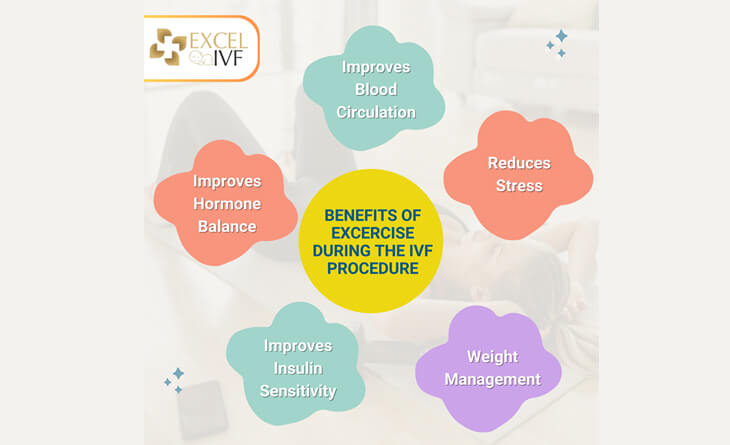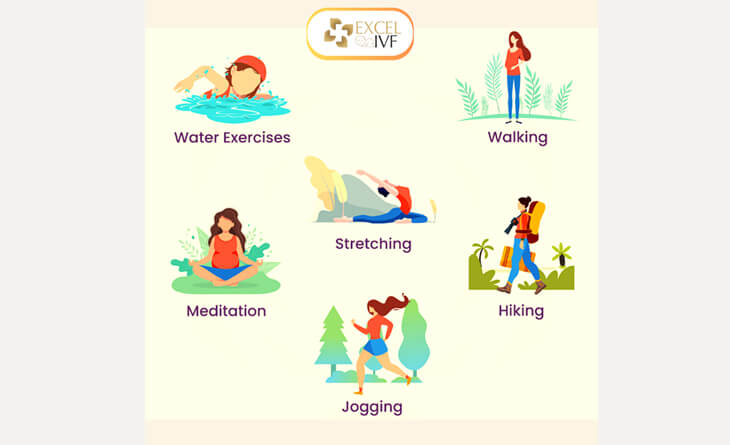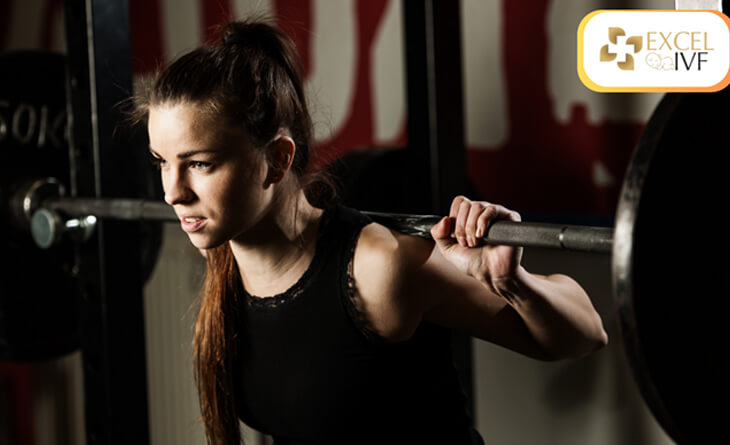Can You Exercise During IVF?
If you are a fitness enthusiast and cannot imagine going a day without working out, you have many questions regarding exercise when considering IVF treatment.
You all know that exercise is good for your overall health and well-being. But on the other hand, you don’t want to do anything that could jeopardize your chances of success with IVF.
But there is good news: exercise is safe during IVF. In fact, exercise can actually be beneficial in your fertility treatment if done with caution.
In this blog post, we will discuss everything you need to know about exercising during IVF, from the benefits to the types of exercise that are safe during IVF to the things you need to avoid.
So, keep reading!
Benefits of Exercise During the IVF Procedure
During the IVF cycle, a complete bed rest is not recommended. In fact, your IVF specialist in Delhi suggests you exercise regularly. It’s a good idea to start with a mild exercise routine. Exercise will help to improve your chances of IVF treatment success. Other benefits of exercise during IVF procedure may include:
Improve Blood Circulation: Light to moderate exercise is a great way to improve circulation, which is essential for a successful IVF cycle. When your blood flows freely, your ovaries and uterus get the nutrients and oxygen they need to produce healthy eggs and support a healthy pregnancy. But don’t go overboard because anything too strenuous could put stress on your body and impact your chances of getting pregnant.
Reduces Stress: IVF treatment can be a stressful process, both physically and emotionally. But don’t worry! Exercise can help you. Exercise is a great way to de-stress, improve mood, and boost overall health. And when you feel good, you are more likely to have a positive view of life.
Weight Management: Being overweight or underweight can impact your IVF treatment outcomes. Exercise can help you maintain a healthy weight, improving your chances of success with IVF. Studies have shown that exercise can enhance egg quality, increase implantation rates, and reduce the risk of pregnancy complications. Focus on low-impact activities.
Improves Insulin Sensitivity: Insulin is a hormone that helps cells absorb glucose from your blood. When your body becomes insulin resistant, it can make it harder for your body to respond to the hormones used in IVF treatment. This can lead to problems like ovulation problems, poor egg equality or implantation failure. Therefore, it is essential to maintain the glucose level during the procedure. Exercise helps your muscles use glucose more efficiently. This improves your insulin sensitivity and helps to lower your blood sugar levels.
Improved Hormone Balance: As you know, IVF is a pretty intense process, and it can seriously disrupt your hormones. But Mild-intensity exercise has been a lifesaver for you. It helps balance your estrogen, progesterone, and testosterone levels. These hormones are all essential for fertility.

Type of Exercises Recommended During IVF Cycle
The best types of exercises to do during IVF are low-impact exercises suggested by the IVF specialist in Delhi. These exercises are easy on your joints and won’t put too much stress on your body. Examples of low-impact exercises are:
Walking: One of the easiest exercises to add to your daily routine is walking. Start with a short walk, and gradually increase the duration and intensity as you feel more comfortable. If you have pain or discomfort, listen to your body and take a break.
Swimming: Swimming is a great way to burn calories, tone your body, and be easy on your joints. Plus, a one-hour swim can give you the same cardio benefits as a half-hour run. And it is so interesting that you will forget you are working out.
Yoga: Yoga is a great way to improve your flexibility, strength, and balance, and it can also help to reduce stress during IVF treatment. But you should avoid any poses that put pressure on your abdomen.
Pilates: Pilates is a fun and easy way to get a strong core and improve flexibility. It’s done on a mat, and you can modify the exercises to make them easier, during the IVF treatment.
During IVF, you can do intense yoga poses in the pre-ovulation phase to improve your blood flow and detox your body. But during retrieval and the days after transfer, it’s best to skip the physical activity and focus on meditation to help your body heal after consulting your IVF specialist in Delhi. Once you feel good, you can start doing gentle yoga poses after embryo transfer.

What Exercises Should You Avoid During IVF Cycle?
During IVF, your ovaries are enlarged than usual. So, any heavy activities that put a lot of stress on your abdomen or uterus could increase your risk of complications, such as ovarian torsion. So, you should follow the precautions in IVF pregnancy while exercising.
So, here is the list of exercises you should avoid during your IVF treatment:
High-Impact Exercises: High-impact exercises like running, jumping, and intense cardio can put a lot of stress on your body, including your ovaries and uterus. This can potentially increase your risk of ovarian torsion and other complications.
Heavy Weightlifting: Heavy weightlifting and other exercises like squats, deadlifts, overhead presses, or heavy ab crunches can strain or pressure your abs.
Contact Sports: Contact sports like basketball, football, and soccer carry a high risk of injury. Avoiding these sports during IVF to protect yourself from falls and other accidents is best.
Any Exercise that Causes Pain or Discomfort: If you are experiencing any pain or discomfort during an exercise, stop immediately.
Following these precautions in IVF pregnancy can lead to a healthy pregnancy.

Guidelines for Exercising During IVF Cycle
Exercise is a great way to manage stress and weight during IVF treatment. However, you should follow a few guidelines before starting the exercises:
Talk to Your IVF specialist: Well, it’s important to ensure your fitness routine is safe during IVF. Some exercises can be too strenuous for women undergoing this process.
For example, high-impact exercises like running and jumping can put too much stress on your body and can be risky.
But that doesn’t mean you have to give up exercise altogether. In fact, exercise is great for women who are trying to get pregnant. It can help to improve your circulation, reduce stress, and boost your overall health.
Therefore, before starting any new exercise program, discuss it with your gynecologist. They can advise you on what exercise is safe for you and how much exercise is right for you.
Choose Low-Impact Exercises: If you love to work out and use it to de-stress, find other ways to burn off that energy during your IVF treatment cycle. If your IVF specialist in Delhi says it’s okay for light exercise, try walking, swimming, yoga, and Pilates. If you can’t work out during part of your cycle, find a hobby like reading, gardening or meditation to help you relax.
Reduce the Time You Spend Exercising: Exercising too much before IVF can impact your chances of success. If you plan to exercise before IVF, keep your workouts to around 30 minutes, two or three times a week.
Take Breaks During Exercising: It is tempting to push yourself when working out, but listening to your body is extremely important during IVF treatment. Your hormones are irregular, and you are more prone to fatigue and other adverse effects. That’s why taking breaks during your workouts for just a few minutes is important to catch your breath and hydrate. And if you are feeling tired or dizzy, don’t be afraid to take a longer break or stop altogether.
Risks Associated with Exercising During IVF
The risks associated with exercising during IVF treatment are relatively low, but it’s important to be aware of them before starting the exercise. These risks may include:
Ovarian Torsion: During IVF, your ovaries are stimulated with fertility injections to produce multiple eggs, which can cause them to become enlarged and heavy. Heavy exercise can increase the risk of ovarian torsion, in which the ovary twists on its supporting ligament, cutting off its blood supply. Ovarian torsion is a rare but serious condition that can damage or even destroy the ovary, and it requires surgery. Therefore, follow the precautions in IVF pregnancy.
Reduced Blood Flow to the Uterus: High-impact exercise can redirect blood flow away from the uterus, potentially reducing the chances of a successful implantation.
Injury: Exercising too vigorously or engaging in high-risk activities could increase the risk of injury, jeopardizing the IVF treatment process.
Dehydration: It’s important to stay hydrated for embryo development. Exercise can lead to dehydration, which can harm the developing embryo.
Take Away!
Exercise is a great way to improve your overall health and well-being and can also benefit people going through IVF. However, high-impact exercise can compromise your IVF success. Therefore, you must consult your doctor before starting any new exercise program.
If you are considering IVF treatment, schedule your consultation with Dr Rhythm Gupta, an IVF specialist in Delhi. She will evaluate your condition and suggest when to start exercising. She will also help you choose the best kind of exercise for your condition and needs.












